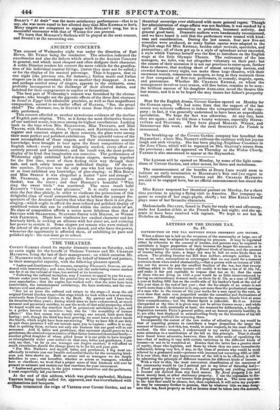ANCIENT CONCERTS.
THE concert of Wednesday night was under the direction of Earl HOWE, Mr. TURLE being the conductor. The selection indicated the excellencies and also the defects which attach to the Ancient Concerts
in general, and which must chequer and often disfigure their character. A noble Director renders his concert the mere vehicle for the gratifica- tion of his individual musical likings, (tastes they must not be called,) or for the display of his musical patronage. Thus it happens, that on one night (the previous one, for instance,) Italian music and Italian singers are in the ascendant, while on another they disappear. A new, and perhaps untried array of singers, appears in the orchestra, some probably incompetent to the discharge of their allotted duties, and indebted for their engagements to caprice or favouritism. The best part of Wednesday's concert was furnished by the chorus-
singers ; who brought out the gigantic effects of the three first choruses in Israel in Egypt with admirable precision, as well as that magnificent ,composition, second to no similar effort of HANDEL, "See, the proud chief." The choruses, too, in CLUCK'S scene from Or/co were admir- ably performed.
This concert afforded us another unwelcome evidence of the decline
of English part-singing. This, as it forms the most distinctive feature of our national music, was once among its highest excellencies. Looking back to the time when Mrs. BILLINGTON, Miss TENNANT, and Miss TRAVIS, with HARRISON, Goss, VAUGHAN, and BARTLEMAN, were the regular and constant singers at these concerts, the glees were among their most perfect and polished exhibitions. The splendid voices of the most accomplished of these singers, and their consummate musical knowledge, were brought to bear upon the finest compositions of the English school : every point was diligently studied, every effect ac- curately proved and ascertained ; and the result was, the most perfect display of its kind that imagination can conceive. The performance of Wednesday night exhibited half-a-dozen singers, meeting together for the first time, most of them feeling their way through their task, and each solely intent upon individual display. Of the en- tire number, HawKiNs was the only one who had any knowledge, or at least exhibited any knowledge, of glee-singing: to Miss BIRCH and Miss STEELE it was altogether a matter " new and strange" : Mr. PEARSALL, a person just caught from some provincial ca- thedral, was the tenor ; and thus HORSLEY'S beautiful "What sing the sweet birds" was murdered. The same result befel ELLrorr's "Come see what pleasures." It is really necessary to
State the fact thus plainly, in order to vindicate the pretensions of this
delightful class of vocal compositions, and to inform the younger fre- quenters of the Ancient Concerts that what they bear there is not glee- singing—which ought to afford the most refined and polished display of combined voices that can be exhibited within the entire circle of art. No class of composition affords a union more felicitous than that of STEVENS with SHAKSPERE, STAFFORD SMITH with Mrz.ToN, or WEBBE with PLETCHER. Music here vindicates her exalted character and her heavenly birth, in seeking an alliance with her sister art, and evincing her power to sustain it. Some singers yet remain who were trained in the school of the great artists we have named, and who have the power,
whenever the opportunity is afforded them, of exhibiting its pure and polished style : the rest must go to school.


























 Previous page
Previous page